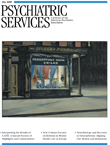In September 2005 the initial report of findings from the Clinical Antipsychotic Trials of Intervention Effectiveness (CATIE) indicated that costly second-generation antipsychotics were no more effective than a first-generation agent. Advocacy groups despaired that these findings would buttress attempts to limit access to the newer agents, and much debate has since ensued about how best to interpret these findings in everyday practice. A special section of nine articles in this month's issue offers clinicians and other stakeholders some much-needed neutral commentary—free of the "thinly veiled industry spin" that has characterized much of the debate about the CATIE findings, according to Marvin S. Swartz, M.D., who served as guest editor of the special section. The first article provides an overview of the CATIE design and main outcomes (
page 500 ). The second article reports results of an analysis of national data to determine trends over ten years in first- and second-generation antipsychotic use and changes in user characteristics (
page 507 ). The third article discusses the intersection of the science of cost-effectiveness with policy and political decision making in regard to CATIE and suggests methods to better align formularies with evidence from cost-effectiveness studies (
page 515 ). The fourth article, a commentary, urges caution on use of CATIE as the cornerstone of new formulary policies (
page 521 ). The fifth article examines take-home lessons from CATIE, underscoring the importance of approaches to prescribing that optimize individual benefit-risk profiles (
page 523 ). The authors of the sixth article discuss CATIE implications from the perspective of mental health services researchers, eschewing interpretations that would support "fail-first" formulary policies (
page 526 ). In the seventh article, a clinical researcher from the United Kingdom welcomes the eroding distinction between first- and second-class agents and the end of the preferred status of the newer drugs (
page 530 ). The final two articles summarize perspectives of two other stakeholder groups—state mental health policy makers (
page 534 ) and patient advocacy groups (
page 537 ). As Dr. Swartz notes in his introduction to the special section (
page 497 ) the most enduring lesson from CATIE "is the need to critically and dispassionately evaluate unbiased empirical data and use the best tools available to drive evidence-based policy and practice." In addition, during the past six months when the special section was in review, the journal accepted three reports on trends in antipsychotic use in the era of second-generation agents—one from the United States (
page 540 ), one from Canada (
page 547 ), and one from the Netherlands (
page 554 )—reflecting the ongoing and international focus on this important issue.

